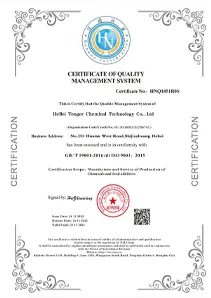
Exploring the Impact and Uses of E202 Food Additive in Modern Cuisine
Understanding E202 The Food Additive with Multiple Benefits
Food additives play a pivotal role in modern food production, allowing manufacturers to enhance the shelf life, flavor, texture, and nutritional value of their products. Among the plethora of food additives available today, E202, also known as potassium sorbate, has garnered significant attention. This article delves into the characteristics, uses, and safety profile of E202, highlighting its importance in the food industry.
What is E202?
E202, or potassium sorbate, is a naturally occurring compound widely utilized as a preservative in various food products. It is the potassium salt of sorbic acid and is recognized by its E number, which signifies its approval for use within the European Union. Potassium sorbate is a white, crystalline powder that is soluble in water, making it easy to incorporate into both food and beverage formulations.
Applications of E202
The primary application of E202 lies in its ability to inhibit the growth of mold, yeast, and some bacteria. This antibacterial and antifungal property makes potassium sorbate an essential ingredient in preserving a wide range of food items. It is commonly found in
1. Dairy Products E202 is frequently used in cheeses, yogurt, and dairy-based desserts to prevent spoilage and extend shelf life. 2. Baked Goods Many commercial baked products, including bread and pastries, contain potassium sorbate to deter mold growth and maintain freshness.
3. Beverages E202 is often added to soft drinks, fruit juices, and wines to preserve flavor and prevent fermentation.
4. Condiments Salad dressings, sauces, and pickles also benefit from the inclusion of potassium sorbate, contributing to a longer shelf life and maintaining taste integrity.
5. Snack Foods Potato chips and other snack items are sometimes treated with E202 to prevent rancidity and spoilage.
e202 food additive

In addition to its preservative qualities, E202 can also enhance the overall quality of food products by maintaining flavor and texture, making it a versatile additive in food manufacturing
.Safety Profile and Regulations
The safety of food additives, including E202, has been a subject of extensive research and evaluation. Numerous studies conducted by regulatory bodies, such as the European Food Safety Authority (EFSA) and the U.S. Food and Drug Administration (FDA), have consistently shown that potassium sorbate is safe for consumption when used within established limits. The acceptable daily intake (ADI) for E202 is 25 mg per kg of body weight, indicating that it can be consumed regularly without adverse health effects.
However, like many additives, some individuals may be sensitive to potassium sorbate, experiencing allergic reactions or other side effects. Therefore, it is essential for consumers to be aware of their own sensitivities and to read product labels carefully.
Public Perception and Future Trends
Despite its established safety profile, the perception of food additives, including E202, can be mixed among consumers. Some individuals prefer to avoid additives altogether, often opting for organic or clean label products that emphasize whole ingredients without preservatives. This trend reflects a growing demand for transparency in food production and a desire for healthier alternatives.
To address these concerns, food manufacturers are exploring natural alternatives to synthetic preservatives, while also reformulating existing products to be free from certain additives. This evolution indicates a shift in the food industry towards cleaner, more wholesome options that still maintain the necessary qualities of shelf stability and safety.
Conclusion
E202, or potassium sorbate, stands out as a crucial food additive in maintaining food quality and safety. Its effectiveness as a preservative across various food categories ensures that consumers can enjoy fresh, safe products. While consumer preferences are shifting towards more natural ingredients, the importance of E202 in the food industry remains undeniable. Understanding food additives like E202 can help consumers make informed choices while appreciating the science behind food preservation. As we move forward, the balance between safety, quality, and consumer preferences will shape the future of food additives in our diets.
-
Pure Sodium Dichloroisocyanurate Dihydrate | Powerful DisinfectantNewsAug.29,2025
-
Industrial Chemicals: Quality & Purity for Every IndustryNewsAug.28,2025
-
Nitrile Rubber Honoring Strict Production StandardsNewsAug.22,2025
-
Aspartame Ingredients Honoring Food Safety ValuesNewsAug.22,2025
-
Fertilizer for Balanced Plant NutritionNewsAug.22,2025
-
Cyanide Gold Processing with High Purity AdditivesNewsAug.22,2025
-
Formic Acid in Textile Dyeing ApplicationsNewsAug.22,2025
Hebei Tenger Chemical Technology Co., Ltd. focuses on the chemical industry and is committed to the export service of chemical raw materials.
-

view more DiethanolisopropanolamineIn the ever-growing field of chemical solutions, diethanolisopropanolamine (DEIPA) stands out as a versatile and important compound. Due to its unique chemical structure and properties, DEIPA is of interest to various industries including construction, personal care, and agriculture. -

view more TriisopropanolamineTriisopropanolamine (TIPA) alkanol amine substance, is a kind of alcohol amine compound with amino and alcohol hydroxyl, and because of its molecules contains both amino and hydroxyl. -

view more Tetramethyl Thiuram DisulfideTetramethyl thiuram disulfide, also known as TMTD, is a white to light-yellow powder with a distinct sulfur-like odor. It is soluble in organic solvents such as benzene, acetone, and ethyl acetate, making it highly versatile for use in different formulations. TMTD is known for its excellent vulcanization acceleration properties, which makes it a key ingredient in the production of rubber products. Additionally, it acts as an effective fungicide and bactericide, making it valuable in agricultural applications. Its high purity and stability ensure consistent performance, making it a preferred choice for manufacturers across various industries.





